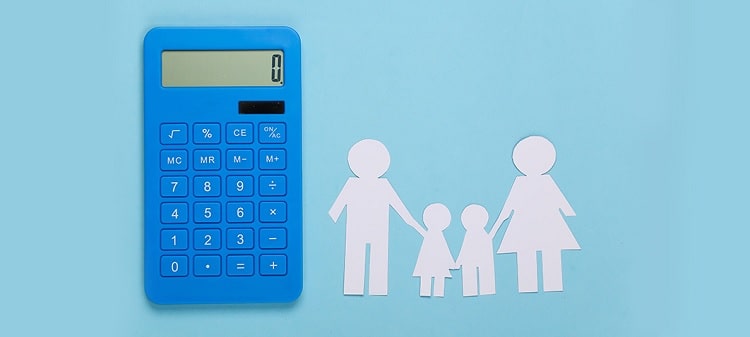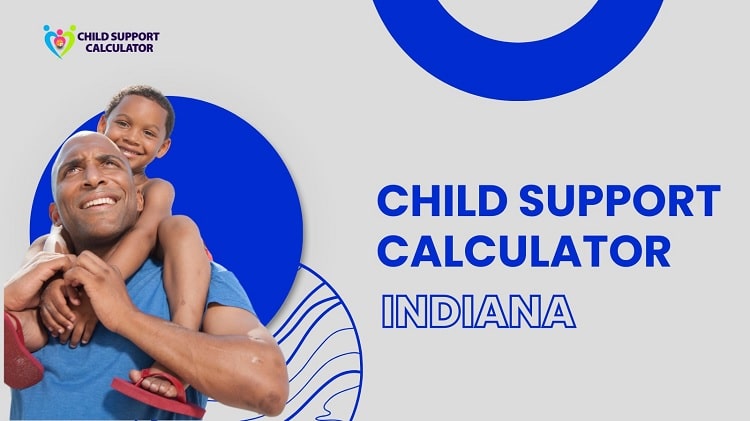New Jersey Child Support Calculator | Guidelines – 2024
The court will almost always issue a child support order as a component of the final divorce judgment in cases involving minor children.
This order usually states that the non-custodial parent must send the custodial parent regular payments, which may be made weekly, bimonthly, or monthly.

Determining the precise amount of child support can cause contention during divorce procedures. To understand what you could be expected to pay or receive, it’s essential to understand how child support is calculated and become familiar with the child support calculator used in your state.
The basic goal of child support is to ensure that kids can maintain a standard of living comparable to what they would have had their parents’ marriage stayed intact.
The basic child support obligation is intended to pay for necessities including rent or mortgage payments, utilities, food, clothing, regular transportation, and minimal medical care.
The number of children who require support and the salaries of both parents are key factors in determining how much child support will be paid.
In some areas, the child’s age may also be considered when determining the amount. In this article, we have explained all about the child support calculator in New Jersey.
Calculating Child Support in New Jersey
The Income Shares Method, a system that considers parents’ incomes to calculate child support, is used in New Jersey. This approach determines the percentage of each parent’s combined gross income that goes toward child support.
Consider Parent A, who makes $48,000 annually, and Parent B, who makes $72,000 annually. $120,000 is the total combined revenue.
With this approach, Parent B’s income accounts for 60% of the total and Parent A’s income 40%. According to the rules, Parent B is liable for paying 60% of the total child support obligation, with Parent A paying 40%.
When one parent has sole physical custody of the child, they are presumed to provide their part of the child’s costs outright. The non-custodial parent must fulfill their portion of the custodial parent’s support duty.
When parents share physical custody, the rules are modified to consider that both parents will be responsible for paying child-related expenses while the kids are living with them.
This recognizes that both parents make financial contributions to the children’s support during their respective periods of custody.
How To Calculate Child Support In New Jersey?
The Child Support Guidelines for the state of New Jersey must be followed to determine support through the child support calculator in New Jersey. Although it might seem complicated, this process can be divided into the following crucial steps:
Calculate your gross income
Finding out the gross income of each parent is the first step. This includes wages, salaries, bonuses, revenue from one’s business, income from renting out space, and income from numerous other sources. Accurate and current financial data collection is crucial.
Make Tax and Deduction Adjustments
You must deduct federal, state, Social Security, Medicare, and any required retirement contributions from the gross income. These deductions determine the net income for each parent.
Combine Net Incomes
After figuring out the net incomes of both parents, add them up to get the household’s total combined net income.
Please see the following Child Support Guidelines
According to the combined net income and the number of children, New Jersey’s Child Support Guidelines offer a schedule of support percentages. You must find the correct proportion on the chart of the rules.
Determine Child Support
You’ll determine each parent’s part of the support obligation by multiplying their total net income by the percentage from the guidelines corresponding to the number of kids.
For instance, if Parent A pays 40% of the support and Parent B pays the remaining 40%, then Parent A is accountable for 40% of the combined net income.
Consider extra costs
You might also need to account for additional costs like child care, health insurance premiums, and expensive medical bills on top of the standard child support obligation.
According to the parents’ respective percentages of income, these additional expenses are normally divided between them.
Shared parenting arrangements
The rules are adjusted to consider the joint costs incurred by each parent during their respective periods of custody if parents share physical custody, and the kids spend a lot of time with both.
Determine the total amount of child support due
You can calculate the total amount of support that the non-custodial parent must pay the custodial parent after considering all pertinent costs and modifications. As the court order states, this sum is normally paid regularly, perhaps weekly, bimonthly, or monthly.
It’s crucial to remember that child support computations can get complicated, especially when addressing exceptional situations.
You can get precise advice based on your unique circumstances by speaking with a family law attorney or utilizing the New Jersey Child Support Calculator, which can be found on the state’s website. Doing so will ensure that you adhere to the rules and regulations of the state.
What Counts as Income Under New Jersey’s Child Support Guidelines?
When determining child support, a parent’s gross income takes into account both earned and unearned income. This comprises:
Income from Employment
Wages, gratuities, commissions, and other employment-related earnings fall under this category.
Income from Self-Employment and Businesses
Gross income for people who work for themselves or own their own enterprises includes earnings from various sources after deducting essential company expenses.
Retirement and Pension Payments
Retirement income, including Social Security retirement benefits, annuities, pension payments, and distributions from retirement programs, is included in gross income.
Government payments
Gross income includes revenue from government programs like workers’ compensation, unemployment insurance, and disability payments.
Investment Income
Income from interest and dividends is included in gross income.
Amounts Paid as Alimony
Alimony payments from either a current or former spouse are included in gross income. Child support paid for kids from a different relationship is excluded, though.
Income from Property Transactions
Rents and other gains from real estate transactions are included in the definition of gross income.
It’s crucial to remember that only distributions from retirement accounts like 401(k)s are considered when determining how much child support should be paid out.
While the parents’ gross income is the beginning point for calculating child support, some deductions are permitted under the rules to establish their net income.
These deductions typically consist of withholding from income taxes, required union dues, and retirement payments.
These deductions aid in computing net income, which serves as the foundation for determining support obligations by state regulations.
Imputing Income to a Parent
Unfortunately, some parents may deliberately lower their income to avoid paying child support. In certain situations, a judge may impute income to a parent if it is found that they are willingly earning less or are unemployed for no legitimate reason.
Simply put, the judge will determine the amount of child support based on the parent’s income. The court considers several variables to determine this amount, including:
Work and Earnings History
The parent’s prior employment and earnings history, including job history and income levels, are considered.
Job Qualifications and Education
The judge assesses the parent’s employment qualifications and educational background to determine their earning capacity.
Health, Age, and Employment Barriers
The parent’s health, age, and any barriers preventing them from finding work are considered.
Local Job Opportunities
Employability prospects in the parent’s region are also considered.
It’s vital to remember that some parents can have good reasons for not working as hard as they could. A parent caring for a critically disabled child, for instance, might not be able to work full-time or at all because of their caregiving obligations.
In these situations, a judge would refrain from penalizing the parent for their lower income because there is a valid and significant explanation for their employment status.
Imputing income prevents parents from evading their financial commitments to their children through willful underemployment or unemployment by making child support calculations fair and accurate representations of their genuine earning potential.
Adjustments to Basic Child Support Calculation
The basic child support amount is subject to several adjustments under the New Jersey Child Support Guidelines, which consider various criteria, including the parents’ financial situation and income. Two key changes stand out from the rest: the price of health care and child care tied to the job.
The quantity of time a kid spends with each parent is one of the most important factors determining child support. This element determines whether the parents will use the child support worksheet for “sole parenting” or “shared parenting.”
Sole parenting
In many situations, one parent, referred to as the Parent of Primary Residence (PPR), serves as both the child’s primary carer and residence.
The other parent, known as the Parent of Alternate Residence (PAR), often enjoys visitation rights, including weekends and one evening per week.
In these circumstances, only one parenting worksheet is utilized, and it is assumed that the PPR distributes its portion of child-rearing costs directly to the child’s welfare.
Shared parenting
When the PAR has the child for a significant equivalent of two or more overnights per week, with the provision of separate housing accommodations for the child in the PAR’s house, the shared parenting worksheet is used. This arrangement denotes a more equitable division of parental duties, and this change calculates child support.
Essentially, these modifications and worksheets are intended to customize child support computations to the parents’ unique conditions and time-sharing schedules.
It ensures that child support responsibilities are fair and appropriate for the level of financial and emotional involvement that each parent has in the kid’s life.
Deviating From the New Jersey Child Support Guidelines
Judges in New Jersey can deviate from the guidelines-based child support calculation, but only in cases where doing so is deemed improper or unfair given the case’s particulars. The suggested amount may need to be adjusted for several reasons, such as:
Excessive parental income
When one or both parents’ incomes are very high or low, deviating from the recommended amount may be acceptable.
Uncovered Medical and Dental Costs
Any parent who has significant unpaid medical or dental expenditures may be entitled to a modification of the determined child support obligation.
Tuition Costs
An adjustment to child support may be necessary for child education costs, such as private or parochial school tuition.
Education-Related Expenses
When determining child support, it might be considered if either parent spends money on additional education or training to increase their ability to work.
Special Needs
Whether gifted or impaired, children with special needs may need more money than what is recommended by the guidelines.
Children’s ages
Given that older children may have different financial demands than younger ones, the ages of the children involved may be considered.
Financial commitments to care for elderly or handicapped family members
Adjustments to support may consider a parent’s proven financial obligations for caring for an aging relative or a disabled person.
Support for Several Families
When calculating child support amounts, it may also be taken into account if a parent is liable for child support in more than one household, according to previous support orders.
How Is Child Support Paid in New Jersey?
In New Jersey, the parent responsible for paying the support is often required to have a certain amount deducted from their paycheck regularly.
There are, however, several exclusions to this rule. If both parties agree in writing and a judge finds a good basis for an alternative arrangement, parents may choose to set up an alternative payment plan (N.J. Rules of Court, rule 5:7-4A, 2023).
Income withholding applies to more than just a parent’s regular wages, and it is crucial to know. A parent paying child support may also deduct it from other types of income, such as unemployment compensation, disability payments, and other types of wages.
The New Jersey Family Support Payment Centre (NJFSPC) manages child support payments in New Jersey. The paying parent must notify the child support agency of any employment changes so that the new employer can set up the income withholding agreement.
There are several ways for parents eligible for child support payments to get their money. They can receive payments through conventional channels like checks, through direct deposits into their bank accounts, or through online payment services like Venmo. Instead, parents can receive child support on a state-issued debit card, which does not need a linked bank account.
These policies and alternatives are in place to ensure that payments for child support are processed quickly, sent securely, and that both parents meet their financial obligations to their children.
When Does Child Support End in New Jersey?
Unless specifically specified in a court-approved agreement or decree, child support obligations in New Jersey normally stop under specific situations without needing a court judgment.
A child’s obligation to pay child support ends when:
- Marries
- Departed
- Enlists in the military
- Unless specific exceptions apply, turns 19 years old.
The automatic termination at the age of 19 is not applicable if:
- The termination age is set differently by a court order (up to age 23).
- The child is still financially reliant on a parent despite having serious physical or mental impairments.
- The kid has been taken out of the house by the state.
- A judge grants the custodial parent’s written request for additional assistance (made before the kid reaches the age of 19).
Up until the age of 23, parents may ask for ongoing assistance if the child:
- Continues to enroll in high school or another secondary program.
- Enrols full-time in a post-secondary institution (such as a trade school or college).
- Has a qualifying physical or mental handicap established by a government agency that existed before turning 19 and necessitates continuing support.
In some extreme circumstances, custodial parents may request continued support after a child turns 19 (N.J. Stat. 2A:17-56.67, 2023). The judge will decide whether to grant this request.
It’s crucial to understand that the termination of a child support order does not absolve the paying parent of any owing back support in arrears.
It is advisable to address emancipation and child support termination issues now, during the divorce process to avoid future conflicts.
How to Enforce Child Support Orders in New Jersey?
When it comes to helping parents with different child support-related issues, the New Jersey Child Support Agency is essential. Establishing paternity, identifying parents who owe child support, and executing existing child support orders are all part of their services.
The agency uses several strategies to guarantee that child support is collected when a parent who is required to pay child support is late on their court-ordered duties. Among these enforcement actions are:
Credit Reporting
The agency might inform credit bureaus of the unpaid child support obligation, which could harm the delinquent parent’s credit rating.
Tax Refund Intercept
The organisation can divert a non-compliant parent’s tax refund towards outstanding child support.
Licence Actions
The parent’s professional and driver’s licenses, among other licenses, may be suspended, denied, or revoked.
Asset Seizure
To cover the unpaid child support arrears, the agency has the right to seize the non-compliant parent’s assets.
Passport Denial
Parents who owe child support can have their passport applications rejected, restricting their ability to travel abroad.
Civil Court Awards
Any civil court awards or settlements the parent receives may be used by the agency to collect child support.
Court Enforceability
If everything else fails, the agency may pursue legal enforcement, leading to an arrest warrant or a finding of contempt if the parent disobeys a court order requiring prompt payment.
To guarantee that child support requirements are paid and parents fulfill their financial commitments to their children, enforcement procedures have been implemented.
Children’s well-being is protected, and they are given the support they are entitled to, thanks to the agency’s proactive approach.
How to Modify Child Support in New Jersey?
If a material change in circumstances justifies a modification, either parent in New Jersey may begin the official legal process for changing child support. Here is a general breakdown of the procedures:
Recognise a Significant Change in the Situation
It’s essential to prove that a significant change in circumstances has occurred since the initial child support order was made before requesting a modification. Changes in the child’s needs, employment status, health, or income may fall under this category.
Collect Documentation
Gather pertinent evidence to support your case for alteration. Examples are paystubs, tax returns, medical documents, or proof of changes in child-related expenses.
Submit a motion for revision
You must submit a move to the court that issued the first child support order to request a revision. The motion shall set forth the grounds for the sought modification and contain proof thereof.
Serve Notice
Following the motion’s filing, you must properly notify the other parent about the desire for a modification and the scheduled court hearing.
Participate in the court hearing
At a court hearing, both parents can present their reasons and supporting documentation. The court will assess the situation and conclude based on the evidence offered and the child’s best interests.
Obtain an amended court order
A new court order reflecting the revised child support amount will be issued if the judge grants the revision. This modified one will replace the old child support order.
It’s vital to remember that child support changes are frequently not retroactive, which means the new order will start to apply from the day the modification application was filed rather than the date the circumstances changed.
To ensure that your rights and the child’s best interests are upheld during the modification process, seeking legal advice or support from the New Jersey Child Support Agency can be helpful.
Conclusion
In New Jersey, child support is determined using the Income Shares Method, which considers several variables, including income, child custody agreements, and childcare costs. Under certain conditions, child support amounts may be modified following New Jersey law.
Through various methods, child support enforcement ensures that parents satisfy their financial commitments to their children which are determined through a child support calculator in New Jersey.
Child support orders may be modified via a formal legal procedure when a material change in circumstances occurs. Overall, the kid’s best interests and parental financial equity are given priority in New Jersey’s child support system.
faqs
How is child support determined in New Jersey?
The judge considers the parents’ combined net income and weighs it against the typical cost of raising a kid in the county where the custodial parent would reside. The judge modifies this expense based on how much time each parent spends with the child on average each month.
What is New Jersey’s maximum child support amount?
The child support guidelines in New Jersey only provide a minimum level of support for households with net incomes above $187,000 and provide no direction on a maximum level.







